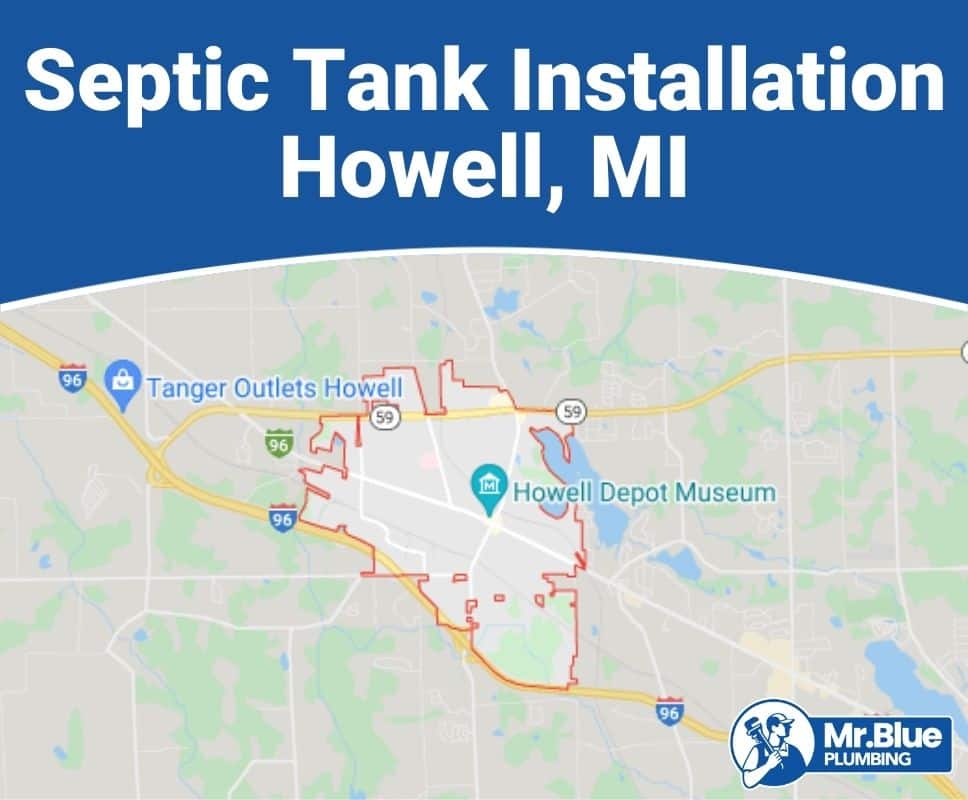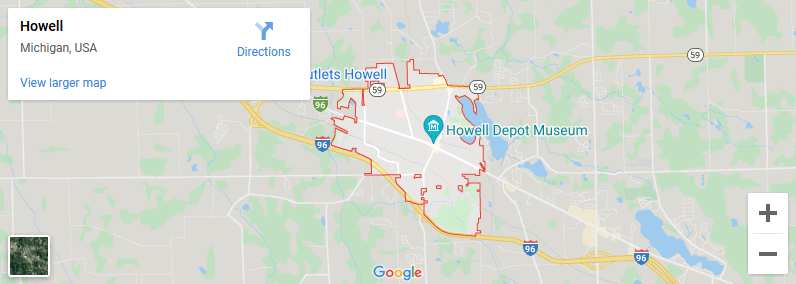Contents (Click To Jump)
- 1 What Is the Process for Septic Tank Installation in Howell?
- 2 How Does Permitting Work For Installing Septic Tanks in Howell?
- 3 How Much Does Septic Tank Installation Usually Cost in Howell?
- 4 What Type Of Septic Tank Is Best for Residents in Howell?
- 5 How Often Do Homeowners in Howell Need to Have Their Septic Tank Inspected?
What Is the Process for Septic Tank Installation in Howell?
When you’re putting in a new septic system, the first thing to do is to get a permit from the county. The permit application is not something homeowners typically manage because septic systems are part of the construction process, and your builder handles all this paperwork. Still, it is good to know the nuts and bolts of both the system and the paperwork process.
How a Septic System Works
The water in your house has two separate sets of pipes: incoming and outflow. The outgoing water, either from a city source or a well, exits into the municipal system or a private septic tank.
We will send out crews to pretty much upend your entire yard. They need to excavate an area big enough to hold the tank and trench a drain field adequate to handle the outgoing wastewater. We can’t stress enough how important it is that your drain field is up to the task your household demands and that it may not be a bad idea to add a reserve field if you have any concerns about capacity. The last thing anybody wants is to have raw sewage floating up into the yard, or worse, backing up into the house.
If you have a septic system installed already, the water flows from the house into a watertight container buried relatively deep underground. The wastewater separates the tank into solids and oil and grease, called scum. The solids form a sludge in the bottom of the vat. The scum float to the surface. At this point, nature takes over, and the sludgy solids begin to decompose, and an anaerobic breakdown of bacteria happens. There are baffles in the tank to keep the sludge from leaving the tank and leaking into the drain field.
Consider the tank and drain field to be like a giant underground toilet, which it effectively is. When the tank is full, every time more waste comes in, an equal amount of effluvia (wastewater) flushes out into the drain field, which is like a filter for the wastewater to go through before it eventually moves on to the next stage.
The drain field is not an actual field; instead, it is a network of perforated pipes, surrounded by gravel and stone, dug into the ground. Geofabric or geotextile, a fabric designed to provide filtration, drainage, reinforcement, and separation in engineering and construction projects, goes on top of the stone and gravel-filled trench so that dirt and other contaminants don’t filter through to the clean stone.
Finally, the wastewater percolates into the surrounding soil. Again, nature kicks in, and microbes and bacteria more or less filter out the contaminants in the wastewater before it reaches the groundwater. The ground surrounding the drain field must be loose enough to allow for this percolation. Without good drainage, the wastewater treatment will not be successful.
The process for installing all of these parts begins with a soil test to confirm that the ground can safely receive the filtered waste. Then, we’ll need to secure permits and begin the excavation. Once the system is installed and connected to your waste system, the city will send out an inspector to sign off on the job, after which we can backfill the area.
How Does Permitting Work For Installing Septic Tanks in Howell?
Now, back to the permitting for a septic system. The first thing you, or more likely, our experts, will do is have the soil evaluated to ensure adequate percolation from the drain field. Assessing the soil is the sort of thing our professionals usually do before they begin construction of a new development, so if your house is new, that paperwork will likely already be done by your builder. You can’t start construction without the septic permit, so don’t worry if you aren’t familiar with the process. These are the other permits you’ll need to proceed with building a house with a septic system.
- Land use permit from your township
- Soil erosion permit from the Drain Commissioner
- Driveway permit from the Road Commission
After you have these permits, a building permit is issued, and construction can begin.
How Do I Apply For My Septic System Permit?
It’s highly unusual to apply for a septic system permit after the fact, but if you are acting as your contractor or building an addition to the house that requires a bigger septic system, here are the forms you need for a septic system complete application.
- Complete application form
- Documentation of permanent street address for new construction (tax bill, deed, township address form, etc.)
- Ten-digit parcel identification number (PIN)
- Copy of survey and legal description
- Copy of accurate plot plan
- Necessary fees
This information must be sent to the Livingston County Health Department, Environmental Health Division.
If you need to submit more detailed information, the Department will let you know within five business days; otherwise, you will get your permit in a few days. It will be forwarded to the township and the Building Official.
Livingston County septic permits are valid from one year of the date they’re issued.
How Much Does Septic Tank Installation Usually Cost in Howell?
On average, the cost to install a new septic system in Howell is a little over $6,300. Keeping in mind that this is only the average, you need to be aware that on the high end, it can cost around $11,000. These are the factors that go into an estimate for a new septic system.
Labor
Local labor costs are the most significant variable in determining how much the project will be. If we manage the permitting, purchasing, and installation of your system, add another $1,000-$2,000 to the final cost.
Supplies and Materials Needed
Second, the costs for the tank and other supplies and equipment can vary. The construction material for the tank is a massive factor in price; some are relatively cheap, but a higher-end tank can cost three times as much.
Additional Equipment and Services
The overall project costs are the final factor. These include big-ticket items like equipment and machinery, surface preparation, clean-up fees, and smaller stuff like permits, building fees, and sales taxes.
What Type Of Septic Tank Is Best for Residents in Howell?
There is no perfect septic tank, but you can determine which one best meets your specifications. The material of the tank may not be as important as other factors. Landscaping, soil type, and tank size matter just as much as whether you opt for concrete, plastic, or steel.
Aerobic tanks are the latest entry into the septic field. They’re made from fiberglass, plastic, or concrete and use oxygen to speed up the decomposition of the wastewater, turning it into sanitized groundwater much faster than the more traditional methods. Aerobic tanks are more expensive but last for many years and do not require a large drain field, so they are great options for smaller lots in Howell.
Concrete tanks are the standard, lasting for decades. Concrete occasionally cracks, allowing waste to seep out, but it is an economical and durable option. It can stand up to the typical soil we have in Howell and will outlast most other materials.
Steel tanks are also durable but only last about 25 years before they rust. A corroded tank roof will eventually be too weak to support the ground above it, putting people and animals at risk of falling through the tank. Compromised tank roofs can be replaced.
Fiberglass tanks won’t crack or rust, and they are pretty lightweight. The downside is that they aren’t heavy enough to stand their ground when the soil surrounding them shifts in response to moisture, as it often does in Howell.
Plastic septic tanks are durable, lightweight, and inexpensive; they don’t rust, and they don’t crack. They are at risk for damage during installation, and they are so light that they can float up above ground if they’re not installed correctly.
Soil Type
The soil surrounding your system needs to drain well, meaning sandier and gravelly soils are often best. Howell soil doesn’t have much clay, so drainage isn’t usually a problem here. Our professionals who install your system will analyze the ground to determine the best spot for the tank.
Landscaping
You don’t want the tank and drain field close to your house, trees, or other buildings. Septic tanks and pipes are vulnerable to tree roots sneaking in and causing leaks and damage. It’s okay to plant some shallow-rooted plants to cover your drain field.
Size
Finally, the size of the tank depends on how much water your family uses. If your daily usage is high, you’ll need a large capacity tank. A 1,200-gallon tank can handle about 500-700 gallons daily.
How Often Do Homeowners in Howell Need to Have Their Septic Tank Inspected?
According to the Michigan Department of Environment, Great Lakes, and Energy (EGLE), residents should have their septic tanks inspected by professionals like us at least every three years. The tanks themselves should also be cleaned out every two or three years.
Homeowners should be aware of other variables that can cause their system to back up or fail between inspections. These are the signs of problems with your septic system.
- An unpleasant odor near the drain field is the first sign of a malfunctioning or failing septic system. Other signs are surface sewage or wet spots around the drain field area.
- Plumbing back-ups or slow draining fixtures that originate at the septic tank
- Gurgling sounds in the septic system






